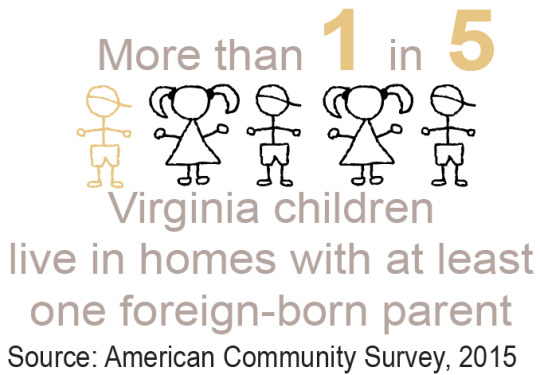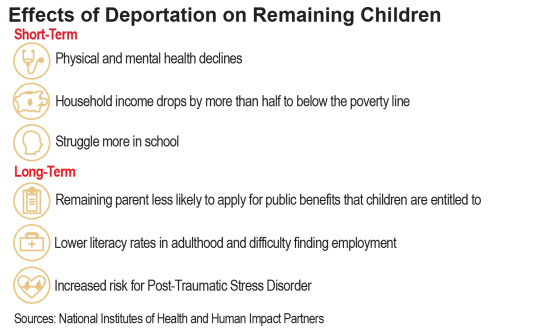June 2, 2017
Deportation: Bad for Virginia’s Children, Bad for Virginia’s Bottom Line
Voices within the immigration debate often speak to immediate concerns and call for immediate solutions. But charged rhetoric, as well as threatened and actual deportations, can lead to serious long-term consequences for Virginia’s children and future economy. Here’s how:
- Fear of deportation and discrimination is rising in families with immigrant members.
- This fear often contributes to serious forms of childhood trauma.
- Trauma has been shown to clearly affect children’s future productivity and ability to contribute to the economy.
With more than 1 in 5 Virginia children living with at least one immigrant parent – and the vast majority of these children are U.S. citizens – the potential impact of their experiences today needs to be assessed.

Many children of immigrants live in fear of their parents’ being detained, arrested, or deported. Even children with documented immigrant parents often develop the idea that the words immigrant and unauthorized are synonymous, so threats of deportation can feel just as real and frightening to them and their family. And research indicates that children who come from households where parents appear to be under threat of deportation are more likely to struggle in school, have lower literacy rates in adulthood, and have difficulty finding employment.
Deportation of parents has been shown to lead to higher rates of anxiety, depression, and post-traumatic stress disorder among the remaining family members, and other health conditions decline as well. Additionally, median income for these households on average drops below the poverty line to $15,400 from $36,000 when a family member is deported – adding to a host of additional challenges for children growing up in these families. And when a parent is deported, not only are the children more likely to have worse outcomes in almost all aspects of their lives and be less productive contributors to the economy as adults, but the public is hit with a secondary cost of caring for these children if they end up in the foster system at around $26,000 per year.

Deportation is not the only source that contributes to trauma and impacts future productivity. Rhetoric coming from legislators and individuals can have real consequences. For example, state legislative proposals with no clear policy impact but that may send a message that immigrants are not welcome in the commonwealth (like HB1468 and HB2000) passed in the General Assembly this year, but were vetoed by the governor. Still, their introduction and the public discourse about them may have led to a rise in fear and feelings of exclusion among immigrants and the children of immigrants in our communities. Additionally, some hate watch groups have cited charged rhetoric, as well as unsubstantiated statements about the threats posed by immigrants, as contributing factors to increases in intimidation and discrimination. In fact, hate crimes towards immigrant groups have been on the rise in the United States over the last few years. When immigrant families are treated like non-members of their communities, they are much more likely to be impacted by mental illness and economic hardship, which can lead to long-term consequences for the children of those families and our communities.
The impact of deportation and threats of deportation on U.S.-citizen children was driven home by the case of Liliana Cruz Mendez, whose arrest by Immigration Customs Enforcement (ICE) during a routine check-in last month made state headlines. Ms. Cruz Mendez migrated from El Salvador in 2006 and has two young U.S.-born children. She was detained in May because of a driving offense from 2013 when she was pulled over for a broken taillight. Governor McAuliffe chose to pardon Cruz Mendez, but there is no assurance that this will prevent her deportation, and indeed ICE has already rejected her recent appeal. Whether or not this Virginia mother is deported, research shows the effects on her two U.S.-born children from the trauma associated with this event are likely to be highly consequential for their development and future well-being.
Deportations and discriminatory rhetoric don’t just hurt unauthorized immigrants, they hurt our families, our communities, and our state by diminishing the readiness and well-being of a large segment of our future workforce. Conversely, the integration of immigrants, especially immigrant parents, into our economy and community will pay dividends in the future. Virginia can either play the short-game, giving in to misplaced fears about immigrants, or the long-game, pushing back on non-welcoming policies and providing the best possible platform for the children of immigrants to succeed. Either way, more than one fifth of Virginia’s children live in households with immigrant parents. They will grow up, and they will be a substantial part of our state’s economy.
Category:
Immigration
